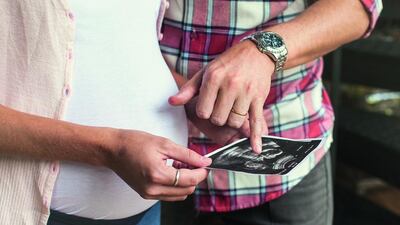Fertility clinics in Dubai are experiencing growing demand from parents seeking to choose the gender of their child.
Some doctors said the cases seen by their practices have doubled in the past five years.
Medical tourists from countries in which gender selection is prohibited account for some of the rise. Last month, British model Danielle Lloyd's decision to seek treatment in the UK made headlines there. The television reality star has four boys and wants to undergo the treatment in Dubai to have a daughter.
But Dr Amal Alias, an Emirati who operates a fertility clinic in Dubai, said most clients want boys, particularly parents from India.
“About 20 per cent of the couples we see choose gender selection,” she said. “Usually, it is requested from people in countries where it is illegal, who then travel to Dubai, where it is widely available.”
Most parents seeking IVF want a son and are willing to pay prices ranging from Dh17,000 to Dh40,000 for the gender selection treatment.
The sex of the embryo can be determined by scientific tests and an embryo of the desired sex is then implanted into the woman's uterus.
Young couples without children rarely request gender selection, Dr Alias said. But older couples or those with an established family are more likely to want to choose the sex of their child.
“Specialist fertility procedures like this are getting more reliable and consistent as the technology develops,” said Dr Alias.
Doctors at the Conceive fertility clinic in Dubai said gender selection now costs less than Dh40,000 and is becoming more popular. In 2014 fewer than five per cent asked to choose their baby’s sex.
Dr Pankaj Shrivastav, clinic founder and medical director, said about 10 to 15 per cent of couples now request gender selection.Family balancing, gender preference and medical reasons are three factors driving sex selection, doctors said. The World Health Organisation is concerned the process can distort the natural sex ratio and devalue females.
Meanwhile, bioethics surrounding gender selection and genetic editing - which goes a step further - is a controversial area of fertility science. Gene-editing can also be used to remove some conditions in unborn babies such as anaemia, which can cost up up Dh18,000.
But some experts cautioned about the proliferation of such treatments.
Prasanth Manghat, executive director of NMC Health, one of the nation’s largest care providers, urged caution before clinics adopted emerging gene-editing techniques.
“Gene-editing promises the capacity to alter the human genome and directly address genetic diseases - a major milestone in the history of medicine,” he said.
“But ... many questions need to be raised on multiple counts of ethics, safety and especially its precision and predictability.”
In 2018, Chinese scientist He Jiankui announced the twin births of the world’s first gene-edited babies, Nana and Lulu.
The twins were born after modifying embryos using clustered regularly interspaced short palindromic repeat (CRISPR) technology, a snipping tool to eliminate defective genes.
By removing the CCR5 gene, doctors hoped it would render the twins immune to HIV. However, a study in Nature Medicine shows people who naturally have the mutation he was trying to recreate were significantly more likely to die young. The CCR5 gene is also known to be active in fighting flu-type viruses.
A week after the births, Mr Jianku claimed he was contacted by clinics in Dubai asking how to use the procedure. Health authorities here said the technique would not be permitted.
Like others, Dr Shrivastav urged caution over clinics considering adopting this type of gene-editing before it is fully understood.
“Gene-editing has only been suggested to be used in extreme circumstances,” he said.
“CRISPR is a highly imperfect technique and, fortunately, so complicated that clinics will find it very difficult to offer these kind of services.”
Islam offers no objection to gender selection within reason, stating the soul only enters the foetus after several weeks of gestation.
The National approached several fertility clinics offering gender selection in the UAE, but none would reveal the numbers of patients choosing the option.
Only a percentage figure of parents choosing the sex of their babies was provided.


